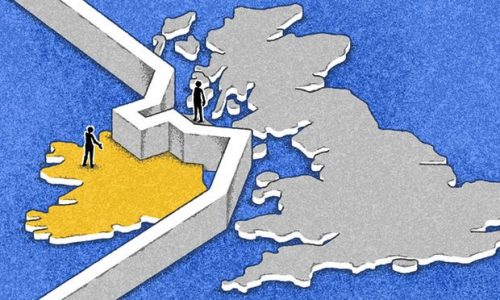The View
The United Kingdom is in a very strange place. The approach to Brexit has been muddled, uninformed and chaotic. It seems that nobody can quite work out what is happening or what should happen.
For Ireland there is equal chaos – there is fear that Brexit will result in huge damage to the economy. Nobody seems to know how to handle the problem. Nothing much seems to be being done, although papers are being produced. Alarm is expressed about the possibility of a hard border both between Northern Ireland and Ireland and between, for example, England and France. The issue of the commitments and obligations of both Governments to the Good Friday Agreement have been raised.
Indicators in Northern Ireland are that the economy in the north is already suffering. Our unemployment levels are now said to be 3.5%. But what does this mean? The actual employment rate is said to be 68%. That accounts for fewer than 72% of our people in the 16-64 working age group. What happened to the other 28%? In Northern Ireland, each person had an estimated £15,719 of disposable income, only 80.9% of disposable income in the rest of the United Kingdom. We know, too, that there is a real growing disparity between those who have and those who have not.
If only 3.5% of people are unemployed why is spending down? Why are businesses closing? Why are so many shops, even in the best high streets, disappearing?
Predictions
The predictions are that Northern Ireland is going into recession. Ireland is in a stronger position. Central Statistics Office figures showed that employment rose by 3.1% in the fourth quarter of 2017; some 2,231,000 people are now in employment. RTÉ reported that this is just 12,000 below the all time peak of employment ever recorded in the State. Income levels are said to be higher than in the North. At the same time, the biggest job losses were seen in professional, scientific and technical activities, which fell by 4.1%. There is a very serious indicator in those falling figures.
When the United Kingdom leaves the European Union, if it does so without any deal which is now being predicted, the questions will be how will the UK trade? With whom will the UK trade on what terms? How will Ireland trade with the UK, its biggest single market?
In the UK, some 141 policy areas and powers will return from EU jurisdiction. Many of them will intersect with the devolution settlement in Northern Ireland reached pursuant to the Good Friday Agreement, and the successor agreements: they range from agriculture to animal welfare to consumer law (in itself a massive area), company law, environmental law, forestry, healthcare, transport, procurement and so on and so on.
All this law will effectively be frozen as EU law until the UK deals with them, in accordance with the provisions of the EU Withdrawal Bill. What will happen then?
What, too, of the various research and development agencies currently benefitting from EU-wide expertise – patients from Ireland being treated in hospitals in England and benefitting from EU research programmes, babies with serious heart conditions from Northern Ireland being treated in Dublin where the best paediatric cardiac services on the island of Ireland are to be found? What of the European Medicines Agency, the Patents Agency, the Intellectual Property arrangements and all the other joint mechanisms which exist for the development and protection of business. What of all the other regulatory processes, such as competition law, currently managed on an EU wide basis in order to secure some equality for business? What too of the arrangements for European policing and security cooperation, vital for our safety and stability in this world of growing organised crime and terrorism?
It is essential that these matters are dealt with in the interests of all parties, but, with negotiations being conducted in the public eye – with no space for nuance and development and testing of ideas – this is not happening. Agreement seems impossible.
Time is short. The UK is due to leave the EU in March next year, just nine months away. Europe is in chaos about how this will work, yet it is in the interest of the whole of Europe to work out pragmatic solutions to multitudinous problems. All our economies are interdependent. If the UK leaves without a deal it will not just be the UK which will struggle. The 27 remaining states will also be affected.
And at this critical time, one part of the island of Ireland, Northern Ireland, has been without a government for 18 months. There is no devolved government with which any part of the EU, or the rest of the UK, can engage or negotiate with. There is no Northern Ireland politician to represent us at inter-governmental meetings. Our civil servants cannot make the decisions necessary to facilitate ordinary everyday activities. Money granted by Westminster cannot be spent because there is no government to spend it, beyond the budgets approved by Westminster.
Confidence
Huge sums of monies were promised for the DUP’s Supply and Confidence Agreement with the Conservative Government. The DUP has supported the Conservative Government thus far. What has happened to all that money?
Does it really suit the two political parties with the biggest votes, the DUP and Sinn Fein to stay out of government, leaving the people in a wilderness, despite the alarms and concerns articulated by the business, the public services and the community as a whole?
Why is this happening? Who is benefitting? Certainly not the people of Northern Ireland and not the people of Ireland whose economy is affected by the situation in the North.
One is reminded of the words of the poet WB Yeats:
Things fall apart; the centre cannot hold;
Mere anarchy is loosed upon the world,
The blood-dimmed tide is loosed, and everywhere
The ceremony of innocence is drowned;
The best lack all conviction, while the worst
Are full of passionate intensity.
Maybe it is not as bad as that, but as we look forward to the coming visit of Pope Francis and the World Meeting of Families, surely our prayers must be for ongoing peace and economic stability, safety and security.
Without these, the family cannot thrive.


 Nuala O’Loan
Nuala O’Loan
